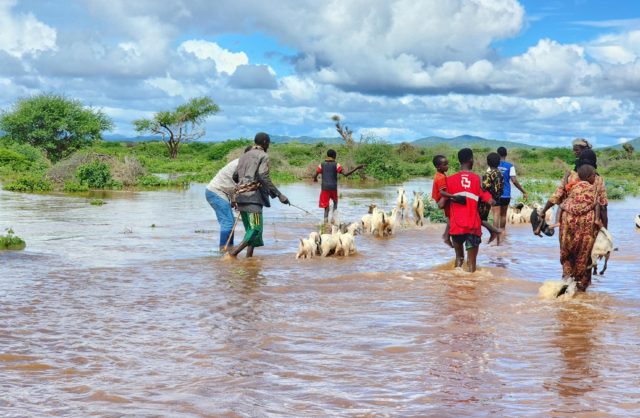
Flooding throughout eastern Africa has killed dozens of people and displaced tens of thousands, underscoring intensifying climate risks in the drought-stricken region, aid agencies reported on Monday.
Heavy rains with varying flood effects have been reported across the country. As of yesterday, 15,264 households have been affected, with 15 people reported dead and at least 1067 livestock deaths. 241 acres of agricultural farmland have been destroyed due to flash floods.
Flooding in Kenya over the weekend uprooted scores of homes, decimated hundreds of acres of farmland, and killed at least 15 people in the country, according to the Kenya Red Cross Society.
Torrential rain swept the usually dry country, sending waters tearing through entire villages and washing through the streets, causing families to evacuate from their homes, local media reported.
The Kenya Red Cross Society, which provides humanitarian relief in the country, also noted that the disaster killed livestock animals were and at least 97 hectares of agricultural farmland were destroyed by the downpour.
Flooding has continued to affect neighbouring east African states as well, with dozens dying in Ethiopia and Somalia.
According to Ethiopia’s regional government, more than 20 people have died and over 12,000 others have been forced out of their homes in the Somali region due to flash flooding this rainy season.
In Somalia, heavy flooding during this rainy season, which runs from October to December, has displaced more than 113,000 people and “temporarily affected” hundreds of thousands, the UN Office for the Coordination of Humanitarian Affairs (OCHA) reported.
The South West and Jubbaland states are the worst hit, with a total of about 536,608 people affected, OCHA said.
Earlier this year, floods forced 250,000 people out of their homes after the Shabelle River in central Somalia broke its banks and submerged the town of Beledweyne

El Nino phenomenon
OCHA said last month that eastern Africa would likely encounter heavier than normal rains over the October-December period because of the El Nino phenomenon.
El Nino is a weather pattern associated with increased heat worldwide, as well as drought in some parts of the world and heavy rains elsewhere.
The Horn of Africa is one of the most vulnerable regions to climate change, with extreme weather events growing increasingly common and intense.
Since late 2020, Somalia as well as parts of Ethiopia and Kenya have been suffering the region’s worst drought in 40 years.
At the end of 2019, at least 265 people died and tens of thousands were displaced during two months of relentless rainfall in several countries in East Africa.
The extreme weather affected close to two million people and washed away tens of thousands of livestock animals in Burundi, Djibouti, Ethiopia, Kenya, Somalia, South Sudan, Tanzania and Uganda.
“Climate change is making floods more frequent and severe,” the Kenya Red Cross Society said after the latest flash flooding. “There is an urgent need to invest in climate adaptation measures to protect communities from the devastating impacts of floods and other adverse weather conditions.”






